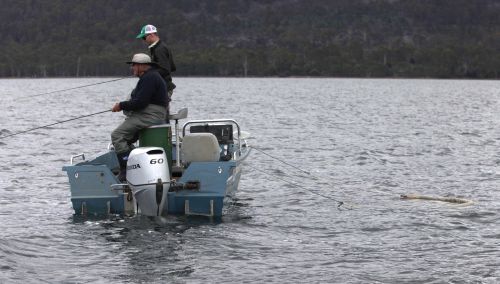Inland Fisheries News - stocking, PFD blitz and more
Trophy Fish Stocked into Brushy Lagoon
Brushy Lagoon received 200 trophy size fish on Monday 15 February - 150 rainbow trout and 50 Atlantic salmon - with an average weight of 4 kg! These quality fish were donated by Sevrup Fisheries, a subsiduary of Petuna.
Compliance Blitz on Boater Safety
Inland Fisheries Inspectors are taking a strong stance on boating safety at inland waters this month. Together with Marine and Safety Tasmania and Tasmania Police, the Service now has zero tolerance for people not wearing life jackets.
The highland lakes have been extremely popular this summer with boating anglers and the fishing has been great. In the rush to get out on the water, however, some anglers are forgetting basic safety rules or perhaps becoming complacent.
After a period of warning, inspectors now have zero tolerance and are serving infringements for either failing to wear a PFD in a vessel under 6 m or failing to carry minimum safety equipment.
Last week, 11 people were booked at a single water for not wearing a life jacket and 21 in total have been booked since November.
The fine for failing to wear a PFD is $60 and $120 for failing to carry minimum safety equipment on board. Ultimately, the cost could be life. Don’t be slack - accidents do happen!
Report of Poaching Pays Off
Thanks to the swift reporting by a member of the public last month, the lives of two giant freshwater crayfish have been saved. As a result of the report, which detailed someone behaving suspiciously at an inland water in the North West of the State, the alleged offender, who was found in possession of the live crayfish, was interviewed for the purpose of prosecution.
Tasmania’s giant freshwater crayfish (Astocopsis gouldi) is one of the largest freshwater invertebrates in the world, with past records of crayfish weighing up to 6 kg. They occur naturally in rivers in northern Tasmania but these populations have declined significantly over the past twenty years due to habitat loss and a long history of traditional fishing.
As a result of its conservation status, Astacopsis gouldi is listed as vulnerable under State and Commonwealth threatened species legislation and it is wholly protected under the Inland Fisheries Act 1995. It is illegal to fish for or to be in possession of giant freshwater crayfish without a permit. The maximum fine is $12,000.
The Inland Fisheries Service is extremely grateful to the concerned person who observed the suspicious activity and reported the sighting. It enabled compliance staff to seek the assistance of the Parks and Wildlife Service in investigating the matter immediately with back up by Tasmania Police. The quick action by these officers resulted in the apprehension of the alleged offender and the release of the two crayfish, as well as the collection of evidence for prosecution.
Help stamp out poaching and other unwanted behavior around our waterways, including vandalism, littering and illegal fishing activities. Collect details to help identify offenders and report this information immediately to the Service on 1300 INFISH during business hours or after hours to the inspector on duty on 0438 338530, or to Bushwatch on 1800 333 000 or to your local police.
Hot Weather Stresses Fish and Service Staff
The IFS has received several reports over the past week from concerned anglers regarding heat-stressed fish at several shallow waters in the highlands. Raised water temperatures result in lower levels of dissolved oxygen for the fish. Waters mentioned include LakePaget, Second Lagoon and the back pond at Howes Bay Lagoon, all in the Nineteen Lagoons area of the Western Lakes, and Bruisers Lagoon near the turn-off to Tods Corner at Great Lake.
Waters mentioned include Lake Paget, Second Lagoon and the back pond at Howes Bay Lagoon, all in the Nineteen Lagoons area of the Western Lakes, and Bruisers Lagoon near the turn-off to Tods Corner at Great Lake. Of these, only Lake Paget resulted in fish deaths with 16 brown trout up to 1 kg being removed last Thursday (11 February) morning.
A number of these waters are stocked annually with adult fish transferred from Great LakeTasmania is famous for, such as sight fishing to good size wild brown trout, attracting many interstate and overseas visitors. to cater for intense angling pressure during spring and summer. They are popular recreational fisheries, being wild trout waters in an untouched landscape yet accessible by foot for day trips. They provide anglers with some of the unique fishing experiences that
The Service is well aware of the threat to fish inhabiting small shallow waters due to high water and ambient air temperatures during summer months. As water temperatures rise, the levels of dissolved oxygen in the water decrease, and fish are unable to extract sufficient oxygen from the water siphoned through their gills. In severe situations, they can die from asphyxiation and turn ‘belly-up’.
Air and water temperatures generally drop over-night, particularly in Tasmania’s highlands, which should give the fish a chance to recover. However, the amount of oxygen available is complicated by the fact that plants photosynthesize during the day, which is when they produce most oxygen. Hence, there are a number of factors which govern the survivability of fish at these waters under extreme water temperature conditions, including bio-thermal mass (water volume and depth), type of substrate, wind exposure and the surrounding vegetation.
In past years, the number of fish stocked into these waters is depleted by anglers long before the summer temperatures peak, so the problem of heat stress and occasional fish death is normally avoided. Although there was no change to the number of fish stocked during the last stocking period, it appears that a good number of fish remain in several of these waters. This is great news for anglers – quality fish and excellent weather – the perfect time to visit these idyllic highland waters.
It is less enjoyable for Service staff, monitoring the condition of fish at certain waters and waiting for the hot spell to pass. While there was a slight reprieve for fish in waters that received some rainfall last weekend, the current hot weather is forecast to continue and there is a chance of further reports of fish suffering from heat stress in the following week.
Risdon Brook Dam Water Level
Southern Water has advised that Risdon Brook Dam which is a fishery reserved for anglers with a disability, is now too low to fish from the platforms. A closed sign has been placed on the pathway to the platforms.
The IFS is looking at different season dates for this water in the future following advice from Southern Water that the water management regime there is such that it is usually too low for fishing by December. The good rains in Spring of last year extended the season beyond the projected December closure through January this year.
Anglers with a disability are advised that other fishing platforms are available on the PlentyRiver at the Salmon Ponds, and on the River Derwent at the New Norfolk esplanade, off Riverside Drive at Bridgewater and Windsor Corner at Lawitta.
Information courtesy Sarah Graham and the Inland Fisheries Service.



